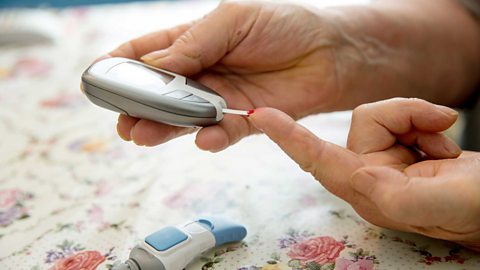Is a low-carb diet better for type 2 diabetes?

What are low-carb diets?
Low-carb diets have been shown to be no better than other calorie-controlled diets for weight loss, but new scientific research suggests low-carb could have specific benefits for people with Type 2 diabetes. We looked into the scienceÔÇŽ
Low-carb diets went mainstream when the Atkins diet burst on the scene in 2003. It focussed on the benefits of following a high-fat and low-carb diet, with the plan advising you to slash carbs to less than 10% of your daily calories to put the body into a "fat-burning" ketogenic state, then slowly reintroducing carbs (though not to the recommended 260g a day that the ).
Over time, the diet went from being trendy to controversial with headlines stating it could , ÔÇťtrigger diabetesÔÇŁ and even that .
The idea of low-carb diets didnÔÇÖt disappear though. Carefully designed, nutritionally complete low-carb diet plans could help people lose weight, just not any more successfully than a low fat diet as shown in a .
But research is emerging that low-carb diets could help treat type 2 diabetes, improving insulin sensitivity even without the dramatic weight loss prescribed as a reversal treatment.
Why are scientists excited about the additional benefits of low-carb diets for T2 diabetes patients?

A carried out by scientists from Aarhus University, the University of Copenhagen and Bispebjerg Hospital, examined whether a low-carb diet would improve the insulin response in patients with type 2 diabetes.
ÔÇťWe examined 28 type 2 diabetic patients in a 12 week cross-over study,ÔÇŁ says Dr Thure Krarup, from the Department of Endocrinology at Bispebjerg Hospital. During six weeks of the study, patients were randomly assigned to a low-moderate carb diet or a low-fat diet, and then switched for the second half of the study.
The hypothesis was that during the low-carb diet phase less insulin would be required in the bloodstream after the low-carb meals, giving the body a chance to recover while the liver and pancreas shed the fat that was impairing normal functioning. "We hypothesised this combination would improve glucose control in type 2 diabetics and reduce the fat content in the liver reducing the risk of non-alcoholic liver disease. This was shown to be correctÔÇŁ.
So what does a "low-moderate carb diet" mean? A low-carb diet can be defined as anything from 10-25 percent of calorie intake. Depending on a person's calorie requirements this could be as low as 50g of carbohydrates per day, or 3 slices of white bread. "In our study," says Dr Krarup, "we used 30 percent, so the diet was a moderately reduced carbohydrate diet. The reason for this being there's a need to have a certain amount of carbohydrates in a healthy diet and also that the diet should be convenient and tasty."
Dr Krarup is keen to point out that the focus of the study was to separate the benefits of carb reduction from weight loss. ÔÇťIt was important to keep the weight constant, so our study is not a weight loss study,ÔÇŁ he says. "Previous studies have provided contradictory conclusions, and weight loss has complicated interpretations in a number of these studies,ÔÇŁ before adding they are currently looking into whether the study will have long-term benefits to the participants.
How low-carb should you go?
Dr Duane Mellor, a senior lecturer at Aston University, says: ÔÇťLow carbohydrate diets can be helpful for people with type 2 diabetes, as the suggest.
ÔÇťI was part of the British Dietetic Association group that worked with Diabetes UK to put out , which discusses the benefits of the low-carb diet for people with type 2 diabetes. It suggests a low-carb diet should be between 50g and 130g of carbohydrate a day (approximately 10-25% of calorie intake). A simpler message would be to aim to eat a diet with less refined carbohydrate and sugar, moderate portion sizes of carbohydrate rich foods (e.g. to the size of your clenched fist). For most people a reduction in carbohydrate and overall energy (calorie intake is enough).
ÔÇťHowever, it is important for people who take medication to manage their diabetes (and especially insulin), to seek advice first as a low carbohydrate diet could increase their risk of hypoglycemia, their doctor or diabetes team will be able to support them to do this safely. The other point, is to think about the foods you are leaving out of your diet if you are following a low carbohydrate diet, what other foods could you start eating to make sure you continue to have a balanced diet. So if you are eating less bread and cereal for example, you may wish to consider including more vegetables which are sources of fibre such as spinach, broccoli and aubergineÔÇŁ.
"I would not encourage an intake below around 50g per day, as you will be dependent on having enough amino acids from protein to make enough glucose for your the inner parts of your kidney (renal medulla) and red blood cells" says Dr Mellor.
There is further caution advised

Newcastle UniversityÔÇÖs Professor Roy Taylor has carried out research into , and thinks the research into low-carb diets isn't yet conclusive.
"Until our recent series of research studies, it was thought that type 2 diabetes was a complex condition caused by many different factors and that it was inevitably progressive. Now that we have proved that it is caused by too much fat accumulating inside liver and pancreas, a very simple (not necessarily easy) approach is clear: Lose weight."
So why does he think thereÔÇÖs a renewed interest in whether low-carb diets could aid those with type 2 diabetes?
ÔÇťThere are two reasons. Firstly, short term success with a low carb approach is fairly easy to achieve because the ÔÇśrulesÔÇÖ are simple to explain. Secondly, some healthcare providers are highly motivated to overstate their benefits, some swayed by excellent personal experience (due largely to their own charisma) or swayed by commercial motives. Especially in the US, such diets are provided at very considerable cost (around $5,000 per year).
ÔÇťEvidence that low-carb diets can work for some individuals is clear but there is no hard evidence that they are superior to other diets. However, we should be aware that in the UK we habitually consume around 47% of calories as carbs and this is much greater than the rest of Europe where the level is between 43 and 45%.
"The longer term challenge of keeping the weight off is considerable. This is really a whole-population problem for us, the ÔÇśFat ManÔÇÖ of Europe. Until legislators grasp the nettle and act to prohibit fast food outlets near schools, regulate added sugar and composition of ready meals, for example, everyone will struggle."
So if youÔÇÖre keen to lose weight to improve your health, what should you do?
Diabetes UK have that follow a low-carb, Mediterranean or conventional low-calorie approach.
The experts agree that if youÔÇÖre keen to lose weight the key is to find a diet thatÔÇÖs sustainable and balanced so youÔÇÖre getting all the nutrients you need.
Prof Taylor explains: ÔÇťIt is important to realise that the details of a diet are important mainly to provide a series of rules to stick to. Success depends on whether any particular diet suits the individual concerned.ÔÇŁ
Dr Mellor adds: ÔÇťResearch seems to suggest it is not the type of diet that counts, itÔÇÖs about finding a way of eating that is healthy, lower in energy but above all enjoyable so that you can stick with it long enough to maintain your health gains. For some people that could be a low carbohydrate diet, for others it could be low fat or vegan. The important thing is it can be enjoyed for the long term, and the foods you have taken out of your diet, are replaced with other foods which although lower in energy (calories) still provide the other nutrients you needÔÇŁ.